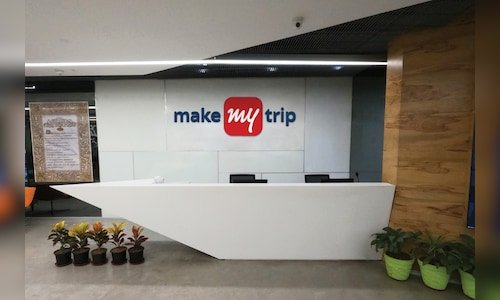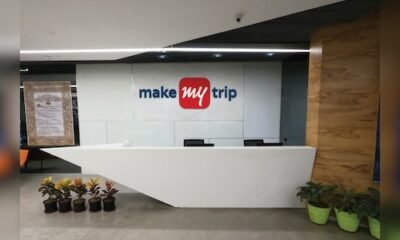AI in Travel
MakeMyTrip’s Myra AI Assistant Sparks Competition Concerns

MediaNama’s Take: MakeMyTrip’s new GenAI assistant does more than help users plan trips. It takes over the entire decision-making journey. Myra handles everything from destination discovery to bookings and post-sales support, all within one conversational flow.
ChatGPT, Gemini, and Perplexity can do the same. So, the technology itself isn’t the issue. The concern is what happens when each platform builds its own AI assistant and starts controlling the entire process, from the first question to the final transaction, without giving users a real way to explore anything outside that flow.
Earlier, travel planning involved friction. Users opened multiple tabs, compared prices, and made deliberate choices. That friction gave smaller providers and online travel agencies (OTAs) a chance to compete. GenAI strips that away. The assistant often offers a single, ranked result and nudges users straight into booking. Most people won’t look beyond what the assistant shows them.
That creates real competition risks. Platforms can push their own listings, promote partner inventory, or surface paid placements while presenting it all as helpful, personalised advice. What seems like a convenience may quietly block other services from view. These are the same concerns the Competition Commission of India (CCI) raised in the Android and Play Store cases, where defaults shaped user behaviour long before anyone actively chose something.
Regulators need to act early. They should ask who controls the flow of information in AI-led interfaces, what ranking logic these assistants follow, and whether users ever see competing options. Myra is just the beginning. The bigger risk is that every major platform builds systems that quietly decide what wins, simply by removing the need to choose.
What’s the News
MakeMyTrip has launched a generative AI travel assistant named Myra, which allows users to plan and book trips through voice, text, image, or video inputs. The assistant is currently live in beta in English and Hindi, with more Indian languages to follow based on early feedback. It can handle queries across multiple travel categories, including flights, hotels, holidays, local transport, visas, and forex.
According to the company, Myra is intended to make the booking process more accessible for users who may not be comfortable with English.
“This launch has the potential to solve for the Bharat heartland… and bring intelligent travel booking to those who’ve long been underserved by digital platforms,” said Rajesh Magow, Co-Founder and Group CEO.
What Are the Details?
Myra responds to open-ended queries like “Where can I go in August for a relaxing holiday with my kids?” or “Mujhe Udaipur mein 3-star hotel 3500 ke budget mein chahiye” and returns personalised suggestions based on real-time pricing and availability. It can manage the full travel journey, including itinerary changes, bookings, and post-sales support, without requiring users to switch interfaces.
The assistant runs on a system of specialised AI agents developed in-house, each focused on different parts of the travel stack. “The scale and complexity of this system make it one of the most ambitious tech builds we have undertaken,” said Sanjay Mohan, Group CTO.
MakeMyTrip claims that Myra bridges the gap between travel discovery and booking, enabling users to go from question to confirmation in a single conversation. Future updates are expected to add semantic search and support for image- and video-based queries.
AI Is Now Core to MakeMyTrip’s Strategy
MakeMyTrip stated during its Q1 FY26 earnings call that artificial intelligence now plays a central role in how the platform plans and books travel. “We are pretty much every quarter releasing something that builds on Generative AI,” said CEO Rajesh Magow.
To support this shift, the company has developed a GenAI engine built on a knowledge graph that combines user preferences, hotel reviews, images, pricing, and location data. This system powers Myra’s ability to respond to natural language queries with relevant and personalised results.
Recent AI features include food-based hotel filters, flight-tracking cabs, and train seat predictions, indicating that AI is no longer just enhancing search but now guiding the full booking journey. According to Dr. Navneet Sharma, Advisor at Helicon Consulting, this kind of deep integration can produce efficiency gains, like lowering transaction costs or streamlining supply. “Aligning incentives between recommendation and supply may lower transaction costs and deliver consumer benefits through better pricing,” he said.
However, Sharma also cautioned that this model comes with risks. “The platform may disadvantage rival providers by relegating them to less visible positions, effectively raising rivals’ costs and excluding them over time,” he added.
Platform Control Raises Self-Preferencing Concerns
Myra’s ability to recommend and fulfil bookings within the same ecosystem raises long-standing competition concerns. Sharma pointed out that MakeMyTrip has faced regulatory scrutiny before. “In 2022, the CCI penalized MakeMyTrip and GoIbibo for using parity clauses and exclusivity obligations that disadvantaged rivals,” he said. He warned that an AI agent promoting its platform’s own inventory—even subtly—could replicate this conduct “in a more sophisticated, less visible form.”
Advertisements
While general-purpose AI agents like ChatGPT and Google Travel can offer similar services, Sharma stressed that their existence doesn’t eliminate the risk. “Genuine contestability needs to be watched. Network effects in digital markets mean dominant agents often enjoy extreme scale economies, rendering others ineffective,” he said.
Default Bias Built Into the Assistant
Much like pre-installed apps on Android, AI assistants introduce default structures that shape how users interact with information. Sharma drew a direct comparison to the CCI’s Android case, where Google’s placement of its own services as defaults altered user behaviour. “An AI assistant that defaults to the platform’s own inventory may bias user behavior, even without overt coercion,” he said.
He added that defaults, when paired with scale and familiarity, can create powerful lock-in effects. “Status quo bias or default bias can lock users into a platform’s inventory simply by inaction. Even when switching costs are low, choice architecture can skew outcomes.”
Transparency and Disclosure Still Missing
Another key issue with GenAI-led interfaces is the lack of transparency in how results are generated or ranked. This opacity raises serious concerns, especially when these assistants become the primary way users discover and book services.
To address this, Sharma argued that platforms should be held to higher standards of disclosure. “Platforms should be required to disclose how AI agents rank and recommend travel options,” he said. This isn’t a new idea. As Sharma pointed out, the draft Digital Competition Bill already includes transparency obligations, and those should clearly apply to travel assistants like Myra.
The logic is simple. As Sharma explained, “A utility-maximizing recommender system may promote competitive pricing, while a revenue-maximizing one can facilitate tacit collusion or favour certain suppliers.” Without knowing which model is at play, users and competitors have no real way to tell whether the assistant’s suggestions are genuinely helpful or quietly skewed in favour of the platform’s business interests.
Impact on Smaller OTAs
The deeper concern is that AI-led booking journeys may edge out smaller travel providers entirely. Sharma warned that the same dynamics the CCI flagged in the MakeMyTrip-GoIbibo-OYO case could reappear in AI-powered form. “An AI tailor-made to prioritise a platform’s own services may deepen this concentration, restricting consumer visibility and competitors’ market entry,” he said.
He added that such models “inherently disadvantage smaller players” by hiding them from the primary discovery path, especially when that path is driven by an assistant that rarely shows alternatives unless asked explicitly.
Why the Competition Act May Need an Update
Sharma believes current antitrust laws may fall short in dealing with AI-led platforms. “India’s Competition Act primarily targets traditional collusion and abuse of dominance,” he said. “AI-powered intermediaries introduce opacity, speed, and self-learning—all of which current ex-post tools may struggle to address.”
He pointed to the Digital Competition Bill’s proposal for ex-ante regulation and systemically significant digital enterprises (SSDEs) as a step in the right direction. “Settlement and commitments offer a better choice to identify anti-competitive conduct and remedy market failures,” he said. He also confirmed that the CCI’s ongoing study on AI and market power will play a key role in shaping the regulatory path forward.
Also read:
Support our journalism:
For You
Source link
AI in Travel
Travel: AI Outshines Colleagues in Travel Planning

Overview: The Growing Role of AI in Travel Planning
A new trend is emerging in the travel industry: travelers are turning to AI for advice and planning, leaving traditional sources like colleagues and influencers behind. According to a recent survey by Booking.com, 67% of travelers now use AI tools when planning trips, with the role of AI becoming increasingly significant in shaping travel experiences across the globe. While AI’s dominance is rising, trust in these tools varies by region.
Why This Trend Is Gaining Popularity:
-
Global Shift Toward Digital Tools: The growing reliance on AI is part of a broader trend where digital and automated tools are increasingly trusted over human sources for advice and recommendations.
-
Increased Accessibility: AI tools provide easily accessible, personalized, and often real-time suggestions, making them more appealing to travelers looking for convenience and efficiency.
-
Desire for New Experiences: Travelers are increasingly seeking authentic, unique travel experiences, and AI’s ability to offer personalized recommendations, including off-the-beaten-path destinations, is gaining traction.
Detailed Findings:
-
AI Outpaces Colleagues and Influencers: AI tools have surpassed work colleagues (19%) and influencers (14%) as trusted sources of travel advice.
-
Regional Trust Disparities: Trust in AI varies globally. Latin America and Asia-Pacific are the most trusting regions (51% and 38% respectively), while North America and Europe show more skepticism, with trust levels at 30% and 28%.
-
AI’s Growing Influence: Travelers are using AI to avoid overcrowded destinations (71%), find experiences that positively impact local communities (60%), and discover new places to visit (38%).
Key Success Factors of the Trend:
-
Personalized Travel Recommendations: AI’s ability to offer tailored travel suggestions, including hidden gems and niche experiences, makes it a valuable resource for modern travelers.
-
Efficiency and Convenience: AI provides immediate recommendations, which saves time and streamlines the travel planning process.
-
Regional Variability in Trust: While AI is gaining trust in many regions, brands need to account for local cultural differences in attitudes toward AI when developing and marketing their tools.
Key Takeaway:
As AI takes a central role in travel planning, it is reshaping the industry. While AI tools are growing in popularity, brands must address concerns about trust, inclusivity, and personalization to ensure they meet the diverse needs of travelers globally.
Main Trend: AI’s Growing Influence in Travel
The main trend is the increasing reliance on AI tools for travel planning, surpassing traditional sources of advice like colleagues and influencers. As AI’s role expands, it is shaping the future of how we travel and explore new destinations.
Description of the Trend:
AI is becoming an indispensable tool in travel planning, helping travelers discover new destinations, avoid overcrowded spots, and plan sustainable trips. However, regional trust disparities show that AI’s acceptance is still a work in progress.
Key Characteristics of the Trend:
-
Global Growth of AI Use: Across different regions, more travelers are turning to AI for planning trips, with Latin America and Asia-Pacific leading the way in trust.
-
Personalization and Customization: AI allows for highly personalized travel recommendations, which appeals to travelers seeking unique experiences.
-
Concerns Over Bias and Inclusivity: While AI is gaining popularity, travelers are concerned about its potential biases and its ability to cater to budget-conscious travelers.
Market and Cultural Signals Supporting the Trend:
-
AI Integration in Other Industries: The rise of AI in various sectors, such as e-commerce, entertainment, and customer service, has made travelers more comfortable with using AI in travel planning.
-
Shift Toward Sustainable Travel: Travelers increasingly want to make responsible travel choices, and AI tools are helping them identify sustainable travel options and local experiences that benefit communities.
What Is Consumer Motivation?
-
Desire for Authentic, Personalized Travel: Consumers are motivated by the desire for unique, off-the-beaten-path travel experiences, which AI can help them discover.
-
Convenience and Time Savings: Travelers want to streamline their planning process, and AI’s ability to provide instant suggestions makes it an attractive option.
What Is Motivation Beyond the Trend?
-
Skepticism and Caution: While many are embracing AI, there is still skepticism, particularly in regions like North America and Europe, where trust in AI for travel planning is lower. Consumers may need more reassurance about AI’s accuracy, transparency, and fairness.
Descriptions of Consumers: Who Are They? What Drives Them?
-
Consumer Summary:Travelers seeking more efficient, personalized, and sustainable experiences are increasingly turning to AI. They are motivated by convenience, the desire for unique experiences, and the potential of AI to provide tailored recommendations that match their preferences and values.
-
Demographics and Lifestyles:
-
Who Are They: Tech-savvy travelers, including Gen Z and Millennials, who are comfortable with digital tools and seek personalized travel experiences.
-
What is Their Age: Primarily between 18 and 40 years old, with a strong emphasis on younger generations.
-
What is Their Gender: Diverse across all genders.
-
What is Their Income: Middle to upper-middle class, with disposable income for travel.
-
Lifestyle: These consumers are active travelers who value authentic experiences, are eco-conscious, and embrace technology in their daily lives.
-
How the Trend Is Changing Consumer Behavior:
-
Increased Reliance on Technology: Consumers are increasingly relying on AI and digital tools for all aspects of their travel planning, signaling a shift from traditional methods to high-tech solutions.
-
Emphasis on Unique Experiences: AI is helping travelers seek out new destinations and experiences that are different from mainstream tourist spots, aligning with the growing desire for authenticity.
Implications Across the Ecosystem
-
For Consumers: AI is empowering consumers by offering them more personalized, efficient, and sustainable travel options.
-
For Brands and CPGs: Travel brands should invest in AI-driven platforms to meet the increasing demand for tailored travel experiences. They must also ensure that their AI tools are ethical, transparent, and inclusive.
-
For Retailers: Retailers in the travel industry, including airlines and hotels, should integrate AI into their services to cater to travelers’ expectations for convenience and personalization.
Strategic Forecast: What’s Next for AI in Travel?
-
More Personalized Travel: As AI technology continues to evolve, it will likely become even more effective at tailoring travel suggestions and itineraries based on individual preferences.
-
Expansion of AI-Powered Travel Platforms: AI-powered travel platforms will continue to grow, offering increasingly sophisticated and immersive travel planning experiences.
-
Greater Focus on Inclusivity and Ethics: To build trust with consumers, brands must ensure that their AI systems are fair, transparent, and inclusive, addressing concerns about bias.
Areas of Innovation (Implied by Trend)
-
AI-Driven Sustainability: AI could play a key role in helping travelers make more sustainable choices by offering suggestions for eco-friendly accommodations, activities, and transport.
-
Local Experience Recommendations: AI could increasingly focus on providing recommendations for local experiences that benefit communities, rather than just mainstream tourist destinations.
-
Ethical AI Frameworks: As AI becomes a staple in travel planning, more companies will need to develop ethical frameworks to ensure their algorithms don’t perpetuate biases.
-
Budget-Friendly AI Solutions: AI can be used to identify cost-effective travel options, addressing concerns that AI could neglect budget-conscious travelers.
-
Interactive Travel Planning Tools: AI could evolve into even more interactive travel tools, allowing users to plan and modify their trips in real-time as new options or recommendations become available.
Summary of Trends
-
Core Consumer Trend: The Rise of AI in Travel Planning: More travelers are turning to AI for personalized, efficient, and sustainable trip planning.
-
Core Social Trend: AI’s Growing Role in Everyday Life: AI continues to expand its influence across various industries, including travel, as consumers embrace it for both convenience and customization.
-
Core Strategy to Follow Trend: Invest in AI-Driven Solutions: Travel brands and platforms should prioritize AI-driven solutions that cater to consumers’ growing demand for personalized and sustainable travel options.
-
Core Industry Trend: The Intersection of AI and Travel: The travel industry is increasingly incorporating AI tools to enhance personalization, efficiency, and sustainability in planning.
-
Core Consumer Motivation: Personalization and Efficiency: Consumers are motivated by the desire for unique, tailored experiences and the convenience of technology-driven travel solutions.
Final Thought: Embracing AI’s Future in Travel
The growing reliance on AI for travel planning signals a major shift in the industry. As travelers embrace technology for more personalized and sustainable experiences, brands must adapt by offering AI-driven tools that are transparent, ethical, and inclusive, ensuring they meet the diverse needs of global consumers.
AI in Travel
AI Goes ‘Mainstream’ in Travel Planning, New Report Finds

Consumer confidence surrounding the use of AI in the travel planning and booking process has reached new levels and by some accounts is going fully mainstream.
A new report from Phocuswright shows that one-third of U.S. travelers now use AI tools to either plan or experience trips – a development the report’s authors call a “seismic shift in traveler behavior.”
“What began as experimentation with ChatGPT, Perplexity or Google Gemini
is now a core component of trip planning for millions,” say the report.
But even more eye-opening, up to 37 percent of travelers say they now “trust GenAi’s recommendations enough to act on them.”
Additionally, just over 50 percent of U.S. travelers have at least tried
GenAI or are actively using it (for any topic, not just travel).
These statistics are based on traveler surveys that took place across the United States, UK, France and Germany between March 31 and April 25, 2025.
Usage by country
GenAI usage in Europe lags that of the U.S., partly due to regulations in the EU. The U.S. leads the pack by far of all countries studied, with 33 percent of travelers using Generative AI in the travel process, compared to 22 percent in the U.K., 19 precent in France and 15 percent in Germany.
Travelers across all countries measured registered a 3- to 4- point increase in usage of GenAI for trip planning from 2024 to 2025.
Booking travel
The new report also looks at how travelers are using AI with regard to the travel process. Between one-quarter and one-third of travelers across countries are already interested in booking travel within a GenAI platform or letting an AI assistant book for them.
“This will be facilitated by the integration of shopping and payment within GenAI environments,” the report explains.
Moreover, widespread adoption of digital forms of ID is expected to further smooth the transition to this type of behavior.
Planning travel
When it comes to using AI to completely plan a trip, usage by country is a mixed bag, with the U.S. no longer in the lead.
For instance, 19 percent of U.S. travelers have used GenAI to plan at least one trip, compared to 30 percent of travelers in France. The UK is tied with the U.S. in this category at 19 percent as well, while in Germany the figure is 16 percent of travelers having used AI to plan at least one trip.
As for continued use of AI in trip planning, 19 percent of U.S. travelers say they have used AI to plan at least two trips, while 14 percent of UK travelers said the same thing, followed by 13 percent in Germany and 11 percent in France.
Looking toward the future
The Phocuswright report predicts that in the coming months and years the travel industry should expect to see “many more developments that will change traveler behavior.”
“ChatGPT will gain popularity, travel company offerings will mature, and Google will roll0out Ai-powered commerce integrated into the search environment and in products commonly used in-destination such as Google Maps,” says the report. “With these advances, travelers will happily follow.”
For the latest travel news, updates and deals, subscribe to the daily TravelPulse newsletter.
Topics From This Article to Explore
AI in Travel
Myra, MakeMyTrip’s new AI assistant, aims to simplify holiday planning in India

The platform currently works in Hindi and English, with plans to add more regional languages to reach deeper into Bharat. Launched in beta, Myra has already seen over 10,000 users, with feedback being used to make conversations more relevant and personalised. Rajesh Magow, Co-founder & CEO of MakeMyTrip, said users range from first-timers to repeat customers, and the focus is on refining context-aware responses for smoother planning.
MakeMyTrip is customising global large language models in-house using its travel content, while integrating them with an agentic framework to deliver a seamless experience.
Alongside Myra, the company has rolled out a global tours and attractions platform with over two lakh activities in 1,100 cities across 130 countries, all priced in Indian rupees. Myra will soon allow travellers to generate itineraries, browse content, and book flights, hotels, and tours in one go.
Despite disruptions in Q1 FY26, the company maintained profitability through disciplined P&L management. It also raised over $2.6 billion via equity and convertible notes to buy back a stake from Trip.com Group in what Magow called a purely financial restructuring. From AI-led trip planning to global expansion and strategic capital moves, MakeMyTrip is betting on technology and scale to shape the future of Indian travel.
Watch the accompanying video for the entire conversation.
-

 Brand Stories3 weeks ago
Brand Stories3 weeks agoBloom Hotels: A Modern Vision of Hospitality Redefining Travel
-

 Brand Stories2 weeks ago
Brand Stories2 weeks agoCheQin.ai sets a new standard for hotel booking with its AI capabilities: empowering travellers to bargain, choose the best, and book with clarity.
-

 Destinations & Things To Do3 weeks ago
Destinations & Things To Do3 weeks agoUntouched Destinations: Stunning Hidden Gems You Must Visit
-

 Destinations & Things To Do2 weeks ago
Destinations & Things To Do2 weeks agoThis Hidden Beach in India Glows at Night-But Only in One Secret Season
-

 AI in Travel3 weeks ago
AI in Travel3 weeks agoAI Travel Revolution: Must-Have Guide to the Best Experience
-

 Brand Stories1 month ago
Brand Stories1 month agoVoice AI Startup ElevenLabs Plans to Add Hubs Around the World
-

 Brand Stories1 month ago
Brand Stories1 month agoHow Elon Musk’s rogue Grok chatbot became a cautionary AI tale
-

 Brand Stories3 weeks ago
Brand Stories3 weeks agoContactless Hospitality: Why Remote Management Technology Is Key to Seamless Guest Experiences
-

 Asia Travel Pulse1 month ago
Asia Travel Pulse1 month agoLooking For Adventure In Asia? Here Are 7 Epic Destinations You Need To Experience At Least Once – Zee News
-

 AI in Travel1 month ago
AI in Travel1 month ago‘Will AI take my job?’ A trip to a Beijing fortune-telling bar to see what lies ahead | China













You must be logged in to post a comment Login